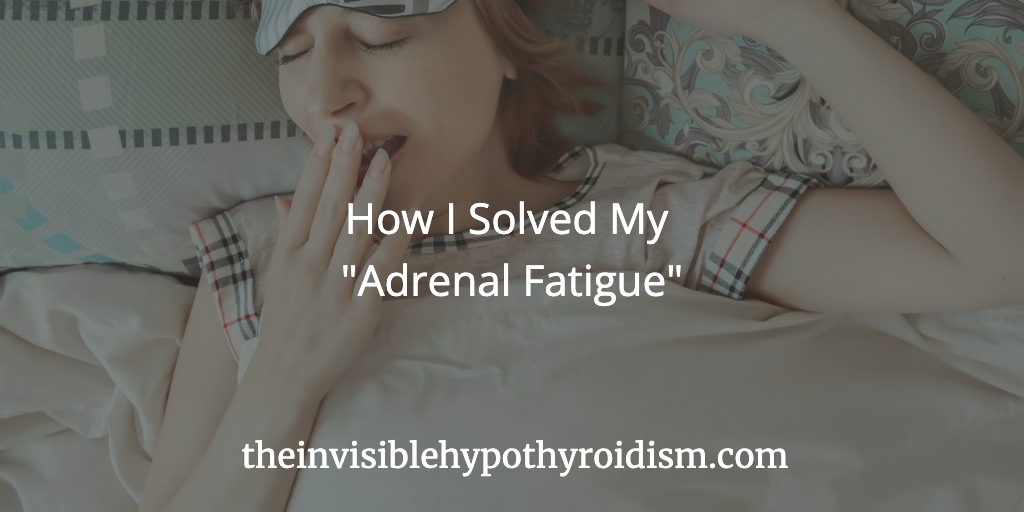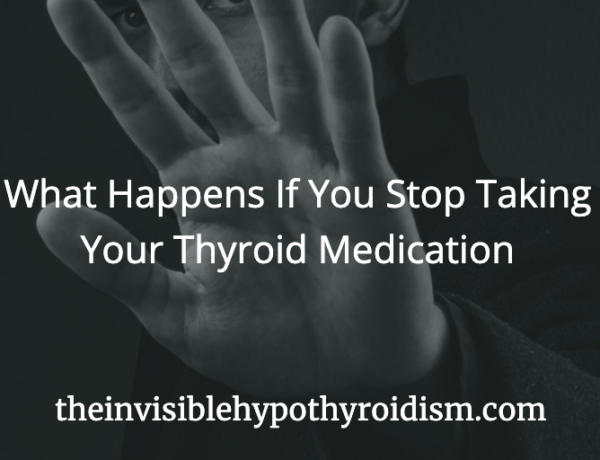Adrenal dysfunction (sometimes inaccurately referred to as “adrenal fatigue”) is a condition not widely recognised by mainstream medicine yet, though it makes a lot of sense to many thyroid patients and is recognised in functional and other lifestyle medicine.
In fact, in Thyroid Pharmacist Izabella Wentz’s experience, adrenal dysfunction is present in 90% of us with autoimmune hypothyroidism. [1]
I was among that 90% and this article will discuss what I did about it.
What is “Adrenal Fatigue”
The most popular concept we see of adrenal fatigue is that the adrenal glands, which are responsible for producing stress hormones, get so tired out from stress that they eventually stop producing enough (or any) hormones. One of which being cortisol. We are told that this is the cause of “adrenal fatigue”.
However, I find this to be an oversimplification.
What I think is more accurately described as “adrenal dysfunction”, is the cortisol slope that can be disrupted in a few different ways, or the ‘HPA Axis’. (“Adrenal Fatigue” may also be referred to as hypothalamic-pituitary axis dysfunction, as this is more accurate)
The slope of cortisol, which we typically see at its highest first thing in the morning and gradually dropping down over the course of the day, can be disrupted when we are chronically stressed.
Chronic stress may alter this ideal slope of high cortisol in the morning and decreasing throughout the day, to:
- low cortisol all day
- high cortisol all day
- low cortisol in the morning and high cortisol at night
Our bodies can respond very interestingly to stress by causing an alteration in this cortisol slope, and this is what we refer to as adrenal dysfunction. I don’t subscribe to the idea of “adrenal fatigue” and the adrenals going kaput.
See also: The Adrenal Glands and Hypothyroidism
Symptoms of Adrenal Dysfunction:
- Struggling to fall asleep at night, or waking up a few hours after you do
- Feeling extremely tired in the morning, despite a lot of sleep
- Experiencing a mid-afternoon ‘slump’
- Feeling more emotional than usual
- Depression or anxiety
- Ongoing fatigue that affects your day to day life
- Feeling unable to tolerate stress
- Hot flashes or sweats
- Intensely craving salty or sugary food
- Dark circles under the eyes
- Dizziness
- Mental fog
- Weight gain
- Low libido
- Extreme tiredness after exercise
- Unable to fall asleep despite being tired
- Heart palpitations
- Feelings of hypoglycaemia (low blood sugar) though test results are normal
- Hair loss
- Irregular Menstrual Cycles
You may have also been on thyroid medication for a while and still feel no better. After all, adrenal dysfunction can be a big piece of our thyroid jigsaw puzzle.
Perhaps when you exercise, you suddenly feel light-headed, a blood sugar drop and faint?
Perhaps exercising at all is a real effort and feels more difficult than it ‘should’ be?
If so, it’s possible you could have adrenal issues.
My Experience With Adrenal Dysfunction
When I suspected cortisol issues back in 2016, I arranged for a saliva test to be done privately (a 24-hour, 4-point saliva test). When I got the results back, they showed that my cortisol was elevated 24-hours a day, indicating adrenal dysfunction and a cause for many of my ongoing symptoms; mainly fatigue.
You can find a test option here.
I experienced heart palpitations, hot flushes, anxiety and sleep complaints. I also really struggled to tolerate much exercise at all.
Addressing this by getting my cortisol levels back in to their normal places was crucial and formed a really big piece of my thyroid jigsaw puzzle.
How Did I Fix Adrenal Dysfunction?
Many aspects were looked at by myself and a functional medicine practitioner.
I’ve listed them below to try and make it as clear as possible. A lot of these also cross over with what I have listed in my Thyroid Jigsaw Puzzle article.
Please keep in mind that some of these may apply to you, but not all. And you may also have other things that need addressing to resolve your adrenal dysfunction. What drives it for each of us can really differ.
Click on the below to discover what I did to address each of these:
- Getting Thyroid Levels Optimal (helped greatly by changing from Levothyroxine to Armour Thyroid)
- Getting Hashimoto’s in to Remission
- Considering Herbal and Vitamin Supplements (note: I tried holy basil and ashwagandha but they didn’t do anything for me)
- Dietary Changes – removing gluten, caffeine and alcohol
- Balancing Blood Sugar – less sugar and more protein
- Addressing My Eating Disorder – no more dieting which was increasing my cortisol levels
- Exploring Oestrogen Dominance (debated if real)
- Choosing Wiser Exercise
- Improving My Gut Health
- Implementing ‘The Spoon Theory’
- Improving My Sleep
- I kept in mind that I am a HSP (highly sensitive person) and learned to take care of this part of myself
- Managing Stress (explained below)
Learning how to manage my stress levels better was imperative if I was to get my adrenal health under control. I could never really get in to meditation, but I did begin to set firmer boundaries on my time. Learning to say ‘No’ sometimes and better prioritise my time and needs felt good.
No more overworking and more time off social media. Less time doing tasks that other people should have been doing themselves and more time reading books, doing yoga and walking in nature. I also tried CBT and saw a Step 4 Therapist on the NHS to help me learn techniques for managing anxiety and stress more effectively.
How To Check for Adrenal Issues
Order or ask for a 24-hour 4-point saliva test (which tests your levels at four key times of day), to find out if you have cortisol issues. If your doctor won’t do this, you can order it yourself and complete it at home, just as I did. You can find a test here.
Most doctors will only test it with a one time urine or blood sample, which is not as accurate. Four samples taken over a 24-hour day show how your rhythm of cortisol production is working. It should be highest in the morning, tailing off throughout the day. Only four saliva samples taken in one day will tell you this accurately.
Have you explored “adrenal fatigue”, better named “adrenal dysfunction”?
You can click on the hyperlinks in the above post to learn more and see references to information given.
See also:
The book Be Your Own Thyroid Advocate: When You’re Sick and Tired of Being Sick and Tired, which builds on this article in detail. Reclaim your thyroid healthy life.
References:
[1] https://thyroidpharmacist.com/articles/pregnancy-announcement/







